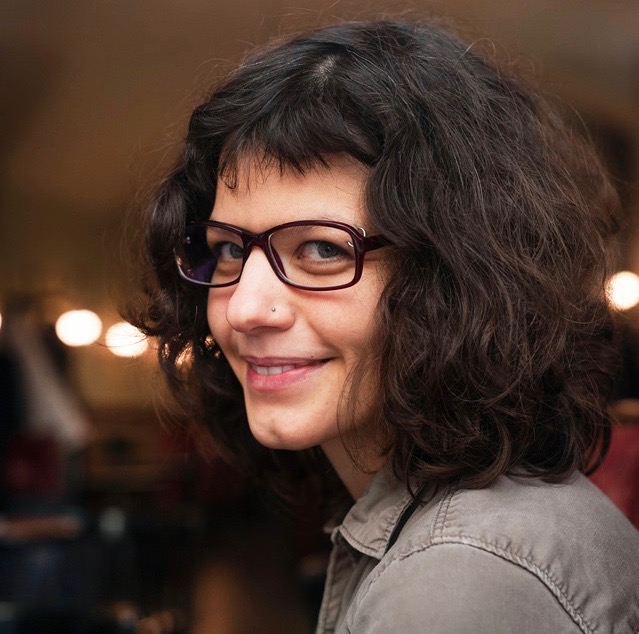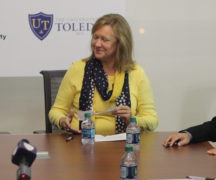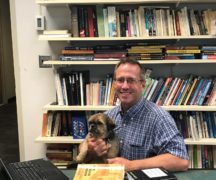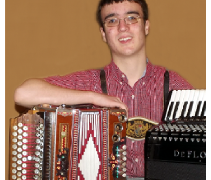By DAVID DUPONT
BG Independent News
Verena Mermer would like to be walking along the Danube River in her hometown of Vienna, Austria.
She’d like to be back in her apartment in the city with her partner.
None of this is possible.
Instead she is 4,500 miles away in Bowling Green.
During an interview about a week ago, Mermer, who is the Max Kade Visiting Writer, reflected on her sudden isolation in a foreign country. The fellowship is part of Bowling Green State University’s longstanding exchange program with the University of Salzburg.
As the threat of coronavirus, which causes the potentially lethal COVID-19, was escalating, Mermer did consider returning home.
She’s rented out her apartment in Vienna to another writer, so her other alternative was joining her partner who is taking care of his parents. “They’re not young,” she said. “If I catch something at the airport and give it to them, I’d never forgive myself. I have to stay until everything gets better and I can go home.”
The decision is now out of her hands as borders have closed.
Mermer was scheduled to give a reading on campus this Wednesday, but that like all normal activities on campus, and off, is canceled.
Mermer continues teaching from an apartment in a residential neighborhood in southeast BG.
The 36-year-old writer is a prize-winning poet and author of two novels, as well as non-fiction work.
She arrived in town in January spending her first weeks here getting ready for the seminar she would teach at BGSU and getting a driver’s license. The latter is something she would never have to bother with in Austria unless she lived in a remote village. This is her first time in the United States. She was invited after BGSU Professor Christina Guenther attended a reading she gave in Austria. “I couldn’t believe it.” She readily accepted the offer.
Her class, mostly for graduate students, focused on contemporary texts that are in some ways autobiographical .
“It was very interesting experience,” Mermer said. “Once we got to know each other the students asked a lot of questions, gave lot of feedback.”
They had enough German vocabulary to discuss the work critically. “It was a good experience.”
Now that will all have to occur from a distance. Mermer hopes to keep those discussions going, though they may be at a slower pace.
“It depends on social circumstances,” she said. “If they have a room of their own to study? If they have a proper internet connection? If they are healthy? If they have to take care of a family member?”
Still she’s looking forward to continuing the discussions started in class. “They can call me. They can Skype call on the phone, or the computer, or chat, or send email.”
Mermer said she continues to write. She has ongoing prose projects writing about National Women’s Day – she went to the demonstration in Cleveland earlier this year – and International Worker’s Day on May 1.
For poetic inspiration, she’s turns to the 100-year-old homes in the blocks surrounding where she lives.
They are so different from the more concentrated neighborhoods back in Austria. Each with “a garden,” that is a lawn.
The houses at first glance seem the same, and yet revealing the personalities of the residents on further examination.
People cautioned her that it is rude here to discuss politics. “But it’s not,” she said. “The way to discuss politics is put a sign in your garden or put a sticker in your car.”
And, she noted: “The people are very friendly. It’s something you would not expect everybody to be in central Europe.”
She and neighbors have agreed that they’ll help each other out if someone becomes ill.
The sprawling commercial districts on the edge of the town are another contrast to her homeland, where shops are more integrated into neighborhoods.
Issues of politics, society and the economy are imbedded in her novels.
Her first, “Die stimme über den dächern (The Voice Above the Roofs),” came from her experience working in Azerbaijan. The story, though, is not about her experience. “I needed to stay with the opposition and journalists and young people. I had to hear it from people.”
The novel tells of two couples caught up in the opposition to the ruling dictatorship.
The novel started as notes for a short story that blossomed into a longer, more involved narrative, Mermer said. “First novels are something given to you.”
Her second novel, “Autobus Ultima Speranza,” also draws on her personal experience. She had a job in Romania, so she traveled back and forth by bus, though she could have flown.
Again, she didn’t stick to her own experience as a privileged young European woman who happened to work in Romania. “It doesn’t explain all these people taking buses and trains.”
Instead she focused on those who traveled from Romania to Austria to work. Poor migrants who picked vegetables, cleaned homes, and tended to the elderly.
They are “keeping the economy of the rest of Europe going and not seeing their families for a long time,” Mermer said. “I wanted to write about them because sometimes their voice is not heard.”
Some women tend to people 24 hours a day, she said, “without having a salary that would be a proper salary for an Austria worker.”
And the coronavirus pandemic further exposes the contradictions and inequalities of the system.
This story, too, grew from a short story. Mermer found she could not tell her story in that form. “I needed more space and more protagonists.”
This is in keeping with the unexpected trajectory of her literary career.
Mermer grew up in the village of St. Egyden am Steinfeld.
At 14 she went to Vienna to study graphic design at a trade school and then to university to study German, Romance languages, and Indian culture and language.
Mermer said she intended to get a doctorate but couldn’t settle on a dissertation topic nor an advisor.
“I was always interested in books,” she said “Becoming a writer just happened to me. I didn’t plan it. I thought it would be something not very likely to happen.”
She has her second novel published, “so now it seems like I’m a writer.”
And a writer in an unbidden literary retreat. In addition to teaching, she now spends her time writing, reading, going out to the yard.
She did have a chance to visit Bloomington, Indiana, where she gave a reading at the University of Indiana, and Cleveland.
In Cleveland she was struck by the disparities of American life. The city is home to one of the great medical centers, the Cleveland Clinic, and yet has a high infant mortality rate.
She had planned other travels to New York City, Washington D.C. and to hike in Hocking Hills. “All the things people like to do in a situation when they have normal lives.”
For now, nothing is normal. She’s looking forward to when the pandemic is under control, “so it’s safe to go back and that everything is all right, and I can see my friends and see my family and walk by the Danube River”




